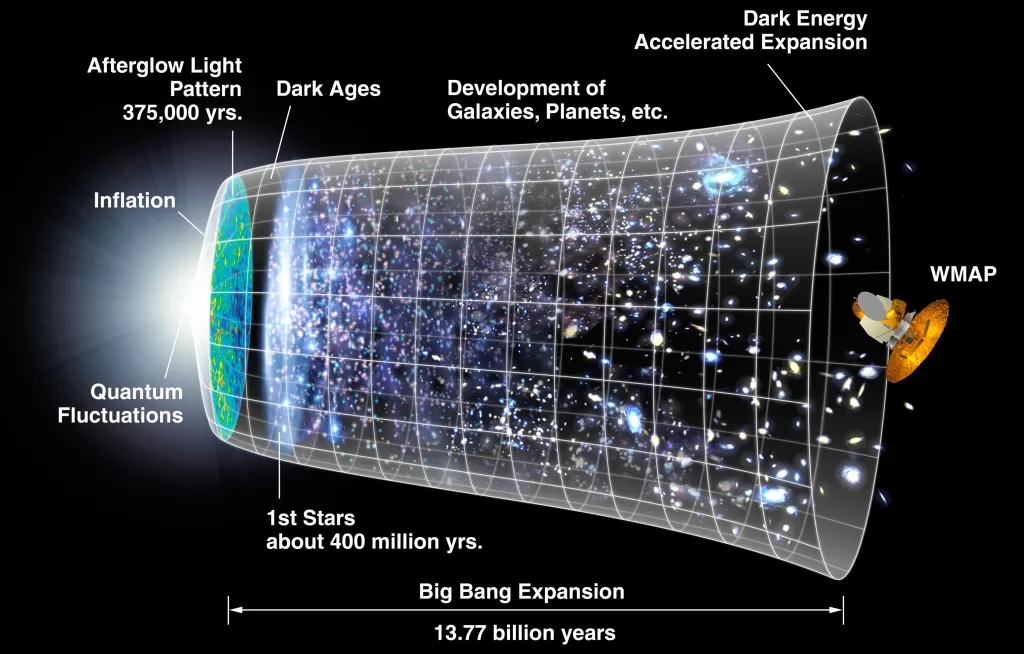Explore five mysteries science still can’t explain in this insightful article, delving into the unknown realms from dark matter to consciousness.
Despite centuries of scientific inquiry, there are still some phenomena that have eluded explanation. From the nature of dark matter to the origin of life, scientists continue to grapple with fundamental questions about the universe and our place in it.
In this article, we will explore five of the most intriguing mysteries that science has yet to solve.
Table of Contents
Why Science Still Can’t Explain Dark Matter ?
Dark Matter remains an enigmatic cosmic entity that continues to perplex scientists, exemplifying a profound area where science still can’t explain the fundamental mysteries.
While scientific certainty acknowledges its existence, the elusive nature of dark matter shrouds its composition and interactions in a veil of uncertainty.
Despite constituting approximately 27% of the universe’s mass-energy content, the crucial question of what dark matter is made of remains unanswered.
This lack of clarity stems from its peculiar quality of not emitting, absorbing, or reflecting light, rendering it invisible to traditional observation methods.
This intrinsic property, coupled with its weak interactions with other matter, makes dark matter exceptionally challenging to study directly.
Thus, the scientific community grapples with the persistent challenge of unraveling the secrets held by dark matter, exemplifying a quintessential instance where science still can’t explain the mysteries that lie at the heart of the cosmos.
Why Science Still Can’t Explain Consciousness ?
Consciousness, a profound facet of human experience, embodies a realm where science still can’t explain the intricacies of its origin and nature.
Despite decades of intensive research, the elusive mechanisms through which consciousness emerges in the human brain remain enigmatic.
The very essence of subjective awareness and self-reflection poses a challenge that science has yet to fully decipher.
Various theories attempt to illuminate this mystery, with some proposing that consciousness arises from intricate neuronal interactions, forming complex neural networks.
On the contrary, alternative perspectives posit consciousness as a fundamental property woven into the fabric of the universe itself.
This captivating dilemma underscores the persistent gap in scientific understanding, highlighting that the profound nature of consciousness continues to elude definitive explanation, marking it as an intriguing frontier where science still can’t unravel the intricacies of human awareness.
Why Science Still Can’t Explain Gravity ?
Gravity, a fundamental force shaping the cosmos, stands as a phenomenon where science still can’t provide a comprehensive explanation despite our understanding of its effects.
Acknowledged as the force that draws objects with mass toward each other, the underlying cause of this gravitational attraction remains elusive.
The enigma lies in the mystery of what precisely triggers this force, a question that has persisted throughout scientific inquiry.
The quest to unravel the mysteries of gravity propels scientists to seek a unified theory that seamlessly integrates gravity with the other fundamental forces governing the universe.
While we grasp the practical implications of gravity keeping planets in orbit and objects grounded on Earth grasping its inherent nature remains an intellectual challenge.
Thus, gravity remains a captivating puzzle, emblematic of the frontiers where science still can’t fully elucidate the intricate workings of the fundamental forces shaping our cosmic reality.
Why Science Still Can’t Explain The Placebo Effect ?
The Placebo Effect, a captivating phenomenon in the realm of medical science, signifies an area where science still can’t offer a complete understanding.
This effect manifests when a patient perceives therapeutic benefits from a treatment lacking any active substance.
The intricacies of how the placebo effect operates elude full comprehension within the scientific community.
Current knowledge suggests that it entails a sophisticated interplay among the brain, immune system, and endocrine system, yet the precise mechanisms remain elusive.
The placebo effect challenges traditional notions of treatment efficacy, showcasing the profound influence of psychological and neurobiological factors on healing.
As scientists delve into the complexities of mind-body interactions, the placebo effect serves as a testament to the gaps in understanding, highlighting a fascinating frontier where science still can’t entirely fathom the intricacies of the human body’s response to perceived therapeutic interventions.
Why Science Still Can’t Explain The Origin Of Life ?
The Origin of Life on Earth remains a tantalizing mystery, representing a pivotal juncture where science still can’t provide a conclusive explanation.
Although scientists possess a robust understanding of the processes governing life’s evolution after its inception, the precise origins remain elusive.
The prevailing theory suggests that life emerged in a primordial soup of organic molecules, setting the stage for the development of living organisms.
However, the critical question of how these molecules intricately assembled to give rise to the first forms of life persists as an enigma.
The quest to decipher life’s origins involves grappling with the complexities of molecular interactions, environmental conditions, and the emergence of self-replicating entities.
Despite significant strides in scientific knowledge, this fundamental aspect of our existence stands as a testament to the enduring mysteries where science still can’t fully elucidate the intricate processes that initiated life on Earth.
Why Science Still Can’t Explain Dark Energy ?
Dark Energy, a mysterious and elusive force, complements the enigma of dark matter, casting a profound influence on the fabric of the cosmos.
Unlike dark matter, which exerts gravitational pull, dark energy operates in opposition, driving the accelerated expansion of the universe.
The nature of dark energy remains elusive, posing a formidable challenge to scientists. Current theories suggest that it may be associated with vacuum energy or a cosmological constant, but definitive understanding remains elusive.

The cosmic expansion, initially thought to be slowing down due to gravity, was discovered to be accelerating, revealing the counterintuitive impact of dark energy.
Through observations of distant supernovae and the cosmic microwave background, scientists have gathered evidence of this accelerated expansion, underscoring the need for a comprehensive theory that unifies dark energy with the fundamental forces governing the universe.
The exploration of dark energy stands as a frontier in astrophysics, beckoning researchers to unravel the mysteries underlying the universe’s expansive dynamics.
Why Science Still Can’t Explain Quantum Entanglement ?
Quantum entanglement, a phenomenon central to quantum physics, introduces a mesmerizing interconnectedness between particles that transcends the constraints of distance.
When two particles become entangled, their states become correlated, and changes in one particle’s state instantaneously influence the other, regardless of the spatial separation between them.
This mysterious and non-local connection challenges classical notions of space and time, confounding our intuitive understanding of the physical world.
Quantum entanglement is a cornerstone of quantum mechanics, emphasizing the non-deterministic nature of particle behavior.
The implications of entanglement extend to quantum computing, secure communication through quantum cryptography, and a profound reconsideration of the nature of reality.
The study of quantum entanglement stands at the forefront of scientific exploration, opening avenues to deeper insights into the fundamental principles that govern the microscopic realm of particles.



Comments